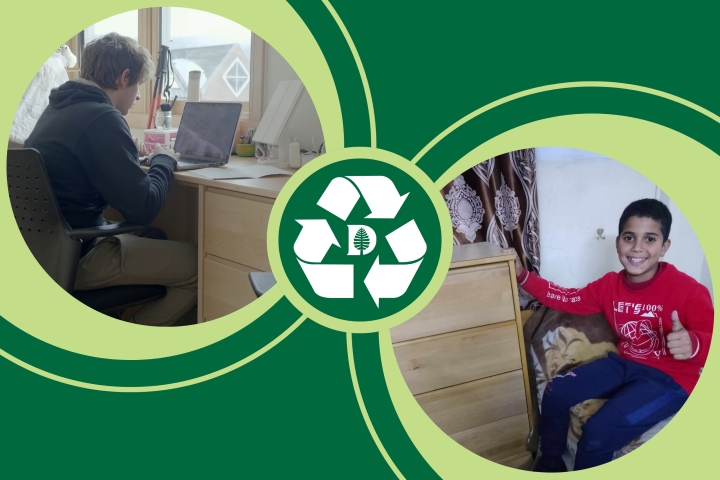The network of initiatives under the Dartmouth Climate Collaborative include high profile projects like developing geo-exchange wells or supporting Greenshot climate entrepreneurship, but also some less visible efforts to foster sustainability and carbon reduction in daily operations around campus.
That’s why the housing renewal work now underway includes projects like furnishing bedrooms with sustainably produced wood furniture sourced from the Second College Grant and manufactured by New Hampshire businesses, and repurposing discarded furniture for use by nonprofit relief and development organizations locally and around the world.
“We have a commitment to sustainability and being responsible citizens,” says Lindsay Walkinshaw, project manager for the Fayerweather renovation project.
While Dartmouth has been using timber from the Second College Grant to produce furniture for campus since 1998, managers are continually looking for ways to promote sustainability and reduce the operation’s carbon footprint, says Kevin Evans, Dartmouth woodlands manager.
Looking for ways to reduce diesel fuel usage in the timber harvesting operations and contracting with DCI Furniture, a sustainable wood furniture producer based in Lisbon, N.H., were two important steps in that process, Evans says.
And the decision to work with a furniture recycling company, though more expensive than using a disposal company, keeps the old furnishings out of the landfill, Walkinshaw says.
“I think it’s just part of our commitment to being good stewards. We talk about all these sustainability goals that we have in the project as it relates to construction, material selection, how we build. And it starts right from the beginning. Recycling furniture, for example, doesn’t get us anything as far as LEED certification points, or save us money. We don’t gain anything other than doing the right thing.”
The company Dartmouth hired for recycling furniture from the renewal projects for Andres Hall, Zimmerman Hall, and the Fayerweathers, The Reuse Network, is run by alumnus Mark Lennon ’78, who lived in Fayerweather as a student. He offered details on the volume of furniture, which includes beds, dressers, and desks, that his company helped repurpose.
“All together, Dartmouth has provided 2,488 pieces that have been reused by nonprofit relief and development organizations, plus another 222 that have been recycled locally. That’s more than 175,000 pounds of useful assets diverted from New Hampshire landfills,” Lennon says.
One container of beds, bureaus, and desks from Dartmouth was delivered to Jordan through the nonprofit WorldHelp to help poor families with basic needs. Other recipients from relief organizations working with The Reuse Network include Haiti, Mongolia, and Zambia.

